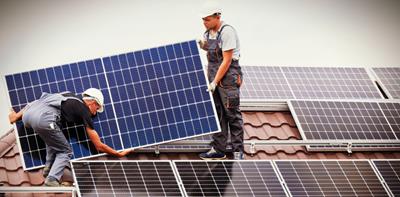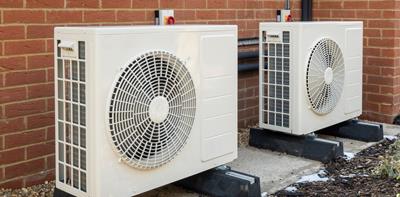
When winter rolls around, we want our homes to be cosy places of comfort. So naturally, we look for ways to keep the heat in and the cold out.
But simply cranking up the heat isn’t the most environmentally friendly (or cost-effective) solution.
Luckily, there are simple ways to boost your home’s cosiness – and they don’t all come with a hefty price tag.
Learn how to make your home more energy efficient with help from Ageas.
EASY AS HACK
Turning all your appliances off at night is a quick and easy way to save energy. Make use of multi-plug sockets so you have fewer switches to flick off before bed.
At a glance
- Energy Performance Certificates give a good indicator of how efficient your home is.
- Insulating your loft and checking your windows are great places to start when it comes to making your home more energy efficient.
- Making your home more energy efficient can lower your bills and increase your property’s value.
How to be more energy efficient at home
There are loads of ways to be more energy efficient at home. But before you can improve your home’s energy efficiency, you need to first understand what you’re starting off with.
Check your home’s Energy Performance Certificate (EPC) to see if your home is using energy well. Your property will have a rating of between A and G and a score out of 100, with A being the most efficient. The average UK property has a D rating, with some room for improvement when it comes to energy efficiency.
Your EPC will also include recommendations to help improve your home’s energy efficiency. These may even come with cost estimates and reveal how much energy you’ll save if you implement them. This can be a great starting point for making your home more energy efficient.
How can energy-efficient homes help combat climate change?
The more energy a home uses, the more electricity is needed. And to make electricity, fossil fuels are burned, releasing carbon dioxide into the atmosphere.
CO2 creates a greenhouse effect, as the gas absorbs heat and radiates it back to Earth.
Over time, the increasing presence of it in our atmosphere has caused the infamous ‘global warming’ phenomenon, spurring on climate change at an alarming rate.
By reducing your home’s energy consumption, say by switching to energy-saving lightbulbs, you play a part in reducing emissions of this greenhouse gas.
You can even go one step further and power your home with renewable energy, sourced from wind, air, water and more.
This kind of energy does not take the toll on the planet that burning fossil fuel does, and releases little to no harmful greenhouse gasses into the atmosphere.
How to create an energy-efficient home
Insulate your loft:
Would you believe a quarter of your home’s heat can be lost if the roof isn’t insulated?1
Adding some extra insulation to your loft will help your home retain heat, and is a fairly undisruptive process. Not to mention cost-effective.
There’s the initial expense of the installation, which is determined by the size of your house, the cost of labour and the materials used.
But after that, you can rest assured you’ll get your money back in energy savings as you shouldn’t need to have your heating on as much.
Install double glazed windows:
Much like a roof, windows cause internal heat to escape, making a home feel colder.
The government estimates that 18% of the heat in UK homes is lost through windows.2
So, by replacing your windows with double or triple-glazed ones, you can cut that figure way back and save on energy bills in the process.
Again, there is a cost attached to this sort of renovation, which is largely influenced by the number and size of the windows that need replacing. But it’s an investment that will typically be worth it for the energy savings later on.
Alternatively, there are cheaper ways to reduce heat loss through your windows. If you’re handy with DIY tools, you can apply tape, weatherstripping or foam sealant to help keep the heat inside.
See our guide for more information on cost-effective methods to insulate your windows.
Switch your light bulbs:
Looking for a quick win to make your home more energy efficient? Just change your light bulbs to LED ones.
They are a little more expensive to buy, but use around 90% less energy. So again, you’re saving on those energy bills in the long term and LED bulbs last longer than standard bulbs.
Unplug your appliances:
Many of us leave our appliances plugged in 24/7. But did you know that even when switched off, they are using power? Think about your hair dryer, laptop charger, toaster, and microwave – are they all plugged in right now?
When your appliances aren’t being used, simply flick off the switch at the wall or remove the plugs from the sockets entirely to save energy and keep costs down. Easy.
If unplugging every item every night seems like too much of a hassle, though, you can also try solutions such as “Standby savers”. These clever bits of kit automatically cut the power to an appliance when it realises it’s gone into standby mode. So no energy is wasted and you don’t need to do a thing.
Insulate your floor:
Another way to reduce your energy bills is to insulate your floor. Like the roof, heat is lost through the ground too, and draughts can also make your home feel colder.
Like any home renovation, the cost of insulating your floor is property, material and labour-dependent. But after that once-off expense, you’re likely to see your energy bills drop substantially.
Install solar panels:
If you want to generate your own free, low carbon energy, installing solar panels is the way to go. These devices effectively generate electricity from the sun, allowing homeowners to power their own properties fully or partially and even sell any surplus back to the grid.
However, although they a viable way to save energy, solar panels are expensive to purchase and are not accessible to everyone. You’ll also need to consider other factors, such as whether there is a suitable location for them on your property, how long they will last before you need to replace them and whether your roof attracts enough sun to really benefit.
But if you choose to go this route, after a few years you can reap financial rewards as the panels will pay for themselves in energy savings.
Discover more in our dedicated guide to solar panels.
Benefits of making your home more energy efficient
- Lower bills
The most obvious benefit of having an energy-efficient home is the slash in energy costs.
When you use less energy, you spend less on gas and electricity. A direct reward for choosing a more sustainable lifestyle.
- Reduced carbon footprint
When your home is energy efficient, it doesn’t use as much gas and electricity, reducing your carbon footprint. So you can rest easier knowing you’re doing your bit to benefit the environment, while saving money.
- Higher property value
Energy-savvy homes are gaining ground in the property market, as more and more people are turning to sustainable lifestyles.
As they are becoming increasingly sought-after, these homes tend to go for higher prices. So, by creating an energy-efficient home, you are not just saving yourself money on bills, but investing in your property.
Could you be eligible for help with your home’s energy efficiency?
If you live in a home with a low energy performance rating, you might be eligible for assistance through the ECO or ECO+ schemes.
Under these schemes, energy providers and local authorities are giving away free insulation, and in some cases, even new boilers.
Check your eligibility through energy regulator Ofgem.
For more information on household energy efficient statistics, read National Statistics’ February 2024 Household Energy Efficiency report.
FAQs
How can you tell if a house is energy efficient?
You may need an inspector to confirm roof insulation and floor insulation, but features like triple-glazed windows and solar panels on the roof are dead giveaways of energy efficiency in a home.
What is a home Energy Performance Certificate (EPC)?
This is a document detailing how energy efficient your home is. It provides a rating from very good to very poor as well as projected energy costs and improvement recommendations. There is a cost to get an EPC and they expire after 5 years.
Do you need good insulation to make your home energy efficient?
Good insulation definitely helps, but it’s not the only way to make your home more energy-efficient. You can replace your single-paned windows with double or triple-glazed ones, for example, to reduce heat loss in the home.
Do modern electric heating systems help cut energy costs?
Yes they can, by offering precise temperature controls so you can maintain the optimal temperature in each room of your home while reducing energy wastage. Find out more.
Why should houses be energy efficient?
Houses should be energy efficient not only for the purpose of being cost-effective but for being kind to the environment. The less energy is used, the less fossil fuels are burned for its creation, resulting in reduced greenhouse gas emissions into the atmosphere.
What type of house is the most energy-efficient?
New-build houses tend to be the most energy-efficient, according to UK Energy Research Centre. Find out more.
For tips on how to stay happy and safe in your home, go to Solved.
[1] https://energysavingtrust.org.uk/advice/roof-and-loft-insulation/


